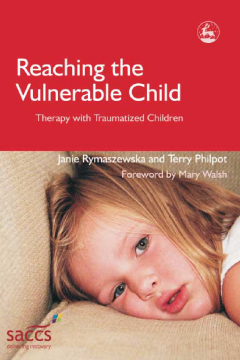
Additional Information
Book Details
Abstract
Therapy is a critical element of work with abused children, offering them the opportunity to explore past experiences in a safe environment with the emotional support of a therapist. Reaching the Vulnerable Child offers a tried-and-tested model of integrated therapy that incorporates play and expressive arts to foster verbal, non-verbal and symbolic communication.
The authors describe how emotional, physical and sexual abuse impact on children's development, and discuss attachment, separation, loss, and the effects of trauma on brain functioning. They provide practical guidance on preparing for sessions and creating safe therapeutic environments, and explain the importance of involving carers in the recovery process. Drawing on a wide range of techniques including play, movement, art, drama, music and therapeutic story work, this approach proposes methods for addressing guilt and low self-esteem, establishing trust and dealing with sexualized or aggressive behaviour.
This guide to working with abused children and young people will be valued by professionals and therapists from a range of backgrounds, including psychotherapists, play therapists and arts therapists, as well as those responsible for children's services. It is an ideal accompaniment to The Child's Own Story, also in the Delivering Recovery series.
Reaching the Vulnerable Child is likely to be of interest to all individuals working with abused children (whether in a therapeutic role or as a parent or teacher).
Journal of Mental Health
This book can be dipped into or read from cover to cover, a boon for any busy therapist or social worker wishing to develop therapy. It also provides exercises for the reader so that they are in touch with a child's feelings and predicaments. It is well worth adding to your library.
Community Care Magazine
For therapists in childhood trauma, this book discusses techniques for helping children who have experienced sexual, emotional, and physical abuse. The authors describe how trauma occurs; attachment, separation and loss; the role of the therapists and the use of toys; what to in therapy, themes; and the evaluation of a child's recovery.
Book News
Janie Rymaszewska and Terry Philpot provide a concise statement of the principles, problems, and process of traditional child psychotherapy. Reaching the Vulnerable Child was a delightful journey for me…The book serves as an important review for the experienced psychotherapist; for the students or younger professional, it is an excellent introduction to play therapy.
APA Review of Books, PsycCRITIQUES
Janie Rymaszewska is Head of Therapy at SACCS. She has an MA in Creative Arts Therapy and is qualified in Play Therapy and Counselling Skills. She has worked therapeutically with children since 1991. Terry Philpot is author and editor of several books, including (with Anthony Douglas) Adoption: Changing Families, Changing Times. He co-authored with Richard Rose The Child's Own Story, also in the Delivering Recovery series. He writes regularly for The Times Higher Education Supplement, The Tablet and other publications, and has won several awards for his journalism. He was formerly the editor of Community Care.
This book is refreshingly accessible. Technical terms are simply explained and the reliance on material from therapy sessionis enlivens the reader's grasp. There are good explanations of how the therapeutic process works through the various stages of therapy. Each chapter is invitingly easy to understand, offering case sypnoses and exercise for the participant reader to heighten self-awareness. The book enriches understanding of the painful but achievable journey of sexually abused children through therapy towards emotional health.
Seen and Heard (NAGALRO)
Table of Contents
| Section Title | Page | Action | Price |
|---|---|---|---|
| THE AUTHORS vi | |||
| PREFACE vii | |||
| 1. The importance of food processing training 1 | |||
| 2. Course preparation 8 | |||
| 3. Course implementation 23 | |||
| 4. Monitoring, evaluation and follow-up 46 | |||
| CASE STUDIES | |||
| 5. Food processing training in Bangladesh 61 | |||
| Shaheda Azami, Sue Azam-Ali and Mike Battcock | |||
| 6. PRODAR’s experience in management training for rural agro-industry | |||
| – the Central American example 70 | |||
| Fran¸cois Boucher and Marvin Blanco | |||
| 7. Training in food processing – a sustainable approach in India 75 | |||
| J.D. John Jayaraj | |||
| 8. Food processing as a micro-business in Nepal 80 | |||
| Sabala Shrestha | |||
| 9. Training in food processing technologies in Peru 85 | |||
| Carmen Rodriguez, Diana Colquichagua, Daniel Rodriguez, Pim Heijster | |||
| and Walter Rios | |||
| 10. Fruit processing training in South Africa 91 | |||
| Joyene Isaacs, Laetitia Moggee and Phillip C. Fourie | |||
| 11. Food processing training in Sri Lanka 96 | |||
| Vishaka Hidellage | |||
| 12. Women mean business in Sudan 104 | |||
| Abdel Gadir, Sue Azam-Ali and Mike Battcock | |||
| 13. Food processing training in Uganda 111 | |||
| Barrie Axtell, Peter Fellows and Mike Dillon | |||
| 14. UNIDO training programme for women entrepreneurs in the | |||
| food processing industry – experiences from Tanzania and Thailand 119 | |||
| Gabriele Herrmann and Tezer Ulusay de Groot | |||
| BIBLIOGRAPHY 127 | |||
| INSTITUTIONS THAT SUPPORT SMALL-SCALE FOOD PROCESSING TRAINING 133 |
